Christianity
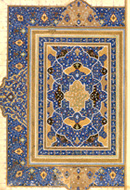 Crossing Borders—Without Passports
Crossing Borders—Without PassportsWednesday, December 19, 2012 by Moshe Sokolow | Jewish Ideas Daily » Daily Features
“Crossing Borders,” a current exhibit at New York City’s Jewish Museum featuring works on loan from Oxford's Bodleian Library, displays medieval Jewish manuscripts embedded in their Christian and Muslim scribal milieus.
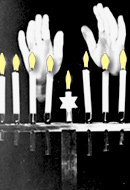 A Meditation on Maoz Zur
A Meditation on Maoz ZurMonday, December 10, 2012 by Ismar Schorsch | Jewish Ideas Daily » Daily Features
In this 1988 essay, Ismar Schorsch writes that the much maligned final stanza of Maoz Zur, which calls for divine retribution against Israel’s enemies, illustrates a distinction between redemption within history and the ultimate redemption, which must come from without.
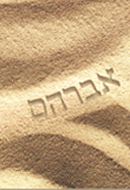 Inheriting Abraham
Inheriting AbrahamTuesday, November 27, 2012 by Jon D. Levenson | Jewish Ideas Daily » Daily Features
On August 28, Jon D. Levenson, the Albert A. List Professor of Jewish Studies at Harvard University, spoke with the current class of Tikvah fellows about his latest book, the first volume in the Library of Jewish Ideas: Inheriting Abraham. Here, an edited transcript of the event.
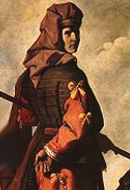 Jacob’s Sons in the Bishop’s Palace
Jacob’s Sons in the Bishop’s PalaceWednesday, November 14, 2012 by Diana Muir Appelbaum | Jewish Ideas Daily » Daily Features
The current Baron Rothschild is one of the British philanthropists backing a new museum of Christianity in Britain, built around a dazzling series of thirteen Baroque paintings, each over eight feet tall.
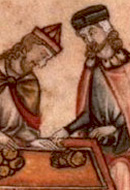 Renaissance Men
Renaissance MenMonday, November 5, 2012 by Adina M. Yoffie | Jewish Ideas Daily » Daily Features
Hugo Grotius. Isaac Abravanel. Rabbi Joseph B. Soloveitchik. These are not names normally mentioned in the same breath, but taken together, their experiences with and thoughts regarding interfaith encounters are instructive.
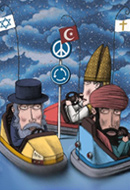 Does Jacob Hate Esau?
Does Jacob Hate Esau?Monday, October 29, 2012 by Jerome A. Chanes | Jewish Ideas Daily » Daily Features
Jews have traditionally kept non-Jews at arm’s length. The rabbinic approach to anti-Semitism may be summarized as Halakhah hi b’yadu’a she-Eisav sonei et Yaakov, “It is an established normative principle that Esau hates Jacob.”
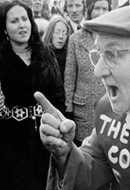 Is Judaism a Proselytizing Religion?
Is Judaism a Proselytizing Religion?Friday, October 19, 2012 by Shlomo M. Brody | Jewish Ideas Daily » Daily Features
When Mitt Romney became the Republican Presidential candidate, some of the media attention focused on his experience as a Mormon missionary in France and asked, subtly or not so subtly, whether a member of a proselytizing religion could properly lead a pluralistic society.
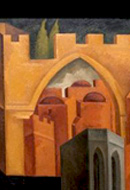 The Hebrew Bible and the Human Mind
The Hebrew Bible and the Human MindMonday, September 10, 2012 by Diana Muir Appelbaum | Jewish Ideas Daily » Daily Features
Yoram Hazony has a bone to pick with Tertullian, the second-century Christian theologian who asked, “What has Athens to do with Jerusalem?”
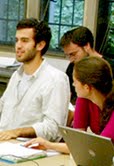 Jewish Studies, Once and Future
Jewish Studies, Once and FutureThursday, August 23, 2012 by Adina M. Yoffie | Jewish Ideas Daily » Daily Features
It’s that time of year again—not just the High Holidays but the time when Jewish college students pore over online course catalogues and make their choices for the fall semester. Will they take Jewish Studies courses? If so, does it matter which ones?
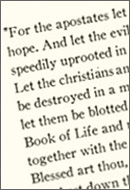 Do Jews Curse Christians?
Do Jews Curse Christians?Tuesday, July 17, 2012 by Allan Nadler | Jewish Ideas Daily » Daily Features
The patristic authority Jerome complained bitterly about the Jews’ condemnation of notsrim (believers in Jesus, “the Nazarite”), in the benediction of the daily Amidah known as Birkat ha-Minim: "three times a day in all their synagogues they anathemize the Christian name."
Editors' Picks
"Are you the Messiah?" James Tabor, Taborblog. Scholars have long dismissed Jesus' self-identification as the Messiah, related in Mark, claiming that his followers called him the Messiah only after his death. But the sources suggest otherwise.
Mapping the Holy Land Matti Friedman, Times of Israel. Founded in 1865 to explore "the land to which we turn as the fountain of all our hopes," the London-based Palestine Exploration Fund completed its survey in June 1914. One month later, war began.
Believing in the Novel J. L. Wall, First Things. Recently, author Paul Elie sounded the death knell for the "novel of belief." But did he overlook contemporary Jewish fiction?
On a Mission to Save Kaifeng Anson Laynter, Algemeiner. After centuries of decline, Kaifeng’s Jewish community has been rejuvenated by an American Christian philanthropist. Is he a benefactor—or a missionary?
Jews Crossing Fred MacDowell, On the Main Line. A 17th-century Sephardic prayer book contains instructions for making "a Jewish sign of the cross" to ward off fear. Was it intended to wean Conversos off Christian ritual?
Reason, Revelation, and Revolution Patrick Allitt, Claremont Review of Books. America's founders have been characterized both as devout Christians and as militant secularists. A new book argues that they remained believers in God, but revolted against the Bible.
Are Christians the New Jews? Yitzchok Adlerstein, Patheos. With Islamist attacks on Christians commonplace from Nigeria to Pakistan, Christians have replaced Jews as numerically the most persecuted people in the world.
The Indonesian Temple Mount Zakir Hussain, Jakarta Globe. His mother is Muslim, his father Protestant. But Yaakov Baruch, who runs Indonesia's only Jewish community, says, "I feel like I'm in Jerusalem."
Anti-Judaism: A Western Tradition Adam Kirsch, Tablet. “Anti-Judaism,” says David Nirenberg, is not an “archaic or irrational closet in the vast edifices of Western thought” but “one of the basic tools with which that edifice was constructed.”
Mahler: A Musical Messiah? Robert R. Reilly, Claremont Review of Books. Born Jewish, but converted to Christianity, Gustav Mahler was never a true believer in either. But did he believe in the divinity of his music itself?

